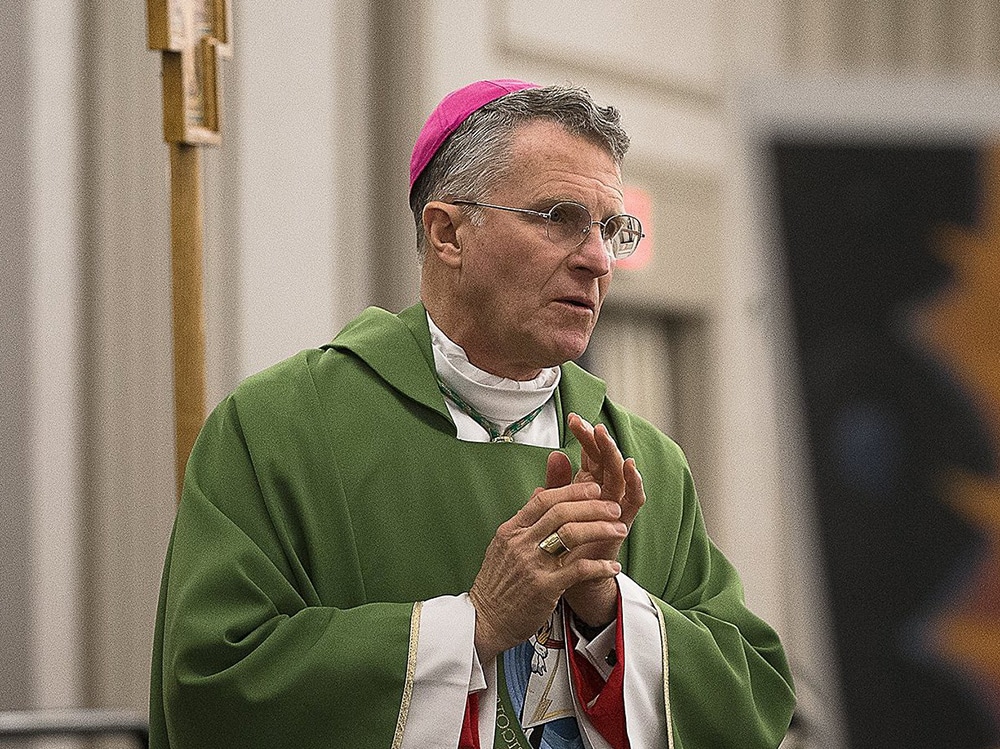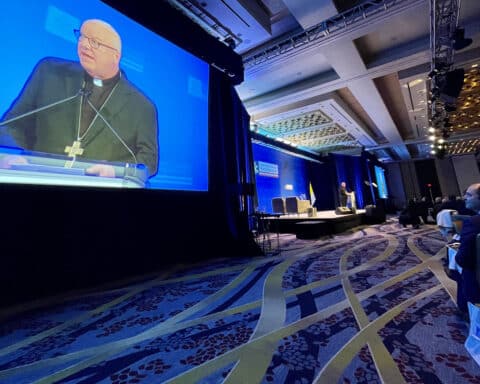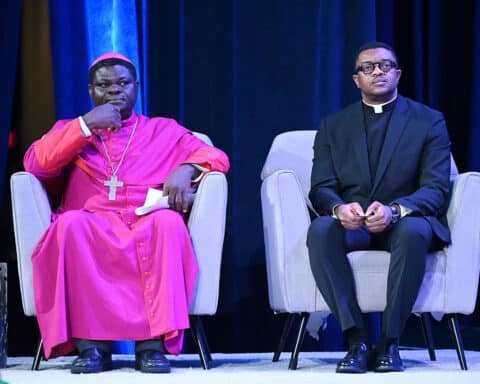Archbishop Timothy P. Broglio, president of the U.S. Conference of Catholic Bishops and archbishop of the Archdiocese for Military Services, preached the following homily at a holy Mass held at the National St. John Paul II Shrine in Washington, D.C., on March 13, the night before the National Catholic Prayer Breakfast.
We are fortunate, because the word of God this evening invites us to contemplate the extraordinary generosity of Almighty God. There is much that we can consider, but let us pause for a moment before the marvelous story of Naaman the Syrian General (2 Kings 5:1-15).
The passage is familiar, and it must have been more so to the audience that the Lord Jesus addressed. It is one of those examples of a gradual awareness on the part of the Chosen People that their special relationship with Almighty God was also a mission, an invitation for others to draw near to the one God. Their experience made this perception very difficult to accept, but this passage makes it clear. It is significant because the National Catholic Prayer Breakfast was introduced in 2004 in response to the call of St. John Paul II to a new evangelization, a reaching out to proclaim to the nations the Good News about salvation through Jesus Christ.
Peace among the nations
The prophet responds to the appeal of the pagan general and even reproves the king of Israel for his reticence. The tension between Israel and Syria was growing, but the prophet made a real attempt to defuse it. Can that not also coalesce with our prayer intentions today? Certainly, the Middle East remains a hotbed of tensions, but we think readily of Ukraine and the unjust aggressions there. We beg for a lasting, just peace and an end to the death of so many innocent people.
Our thoughts and prayers also go out to Africa, a continent troubled by disorder and tension between groups. Many of our neighbors to the south are experiencing turmoil. Think of Nicaragua, where two Catholic universities have been shuttered; the government has exiled several priests and imprisoned a bishop. The list for our prayers of petition for peace and justice could be without end. Those cited are merely examples.
Here we also include those suffering from natural disasters in our own country and throughout the world. Turkey and Syria come to mind, but they are not the only objects of our intentions. We are attentive, and we ask the Lord to respond.
Wash and be made clean
In the narrative, the prophet’s response is very simple. So much so that the general must be convinced to act on his word. The latter expected some magnificent gesture, some quasi magical action. Instead, it was simple: wash and be made clean.
One of our Lenten themes — clearly brought out in yesterday’s magnificent passage about the woman at the well — is baptism, a ritual washing that allows us to be reborn to eternal life. Just as Naaman was made clean in the Jordan, so also we were reborn at baptism so as to continue our pilgrimage to the fullness of life.
A prayer of thanksgiving
Our prayer is also one of thanksgiving this evening. The Lord has blessed us with the sacraments. We rejoice in our ability to assist at his unique self-offering on Calvary — a reality in every celebration of the Eucharist. We seek our spiritual nourishment in holy Communion, an actual participation in the body and blood of the Lord who strengthens us with this most precious gift.
It is also possible to reject the invitation. That was the error of the scribes and the Pharisees. St. Luke places that rejection right at the beginning of the public ministry of the Lord Jesus. The end is foreshadowed here. Jesus announces that he is indeed a prophet and will experience the fate of the prophets. We know that, as Pablo Gadenz writes, “Jesus is still bringing liberty to captives and forgiveness of sins to those who repent and believe in him.”
Contrition and repentance
Indeed, this season of Lent, a time of spiritual retreat for the whole Church, is an invitation for us to deepen our relationship with the Lord, repent of our sins, do penance to create a longing for the definitive victory of Christ that we celebrate at Easter, and practice charity to respond to the needs of our brothers and sisters who depend on the goodness of others.
The notion of contrition can never be far from our prayer. The Church invites us at the beginning of her liturgy to be mindful of our sins and in the final hour of the day, compline, invites us to a revision of the day and repentance again. The season of Lent is a privileged time for the Sacrament of Penance, that cleansing of our sins.
It is also a time to remember, as Bishop Barron points out in his reflection on this Gospel passage, that baptism endowed all of us with the gifts to participate in the roles of priest, prophet and king. Speaking about the prophetic dimension, he added: “As a baptized individual, you are also commissioned as a prophet — which is to say, a speaker of God’s truth. And the prophetic word is not your own. It is not the result of your own meditations on the spiritual life, as valuable and correct as those may be. The prophetic word is the word of God given to you by God.”
The German synod
We might pray here, then, for that unity for which Jesus prayed at the Last Supper. We see so many attempts to divide us. The confusion sown in Germany by their gathering, called Der Synodale Weg (“The Synodal Path”). If truly enacted, there will be a new division in the Body of Christ, and we must pray that there will be reconsideration.
There are also attempts to muddy the clear moral teaching of the Church in matters of the dignity of the human person, human sexuality and the sanctity of holy matrimony. Sometimes we hear a suggestion of a difference between teaching or doctrine and pastoral care. However, we know that nothing truly pastoral fails to begin with the truth. The object of our mission is the salvation of souls.
The pastoral mission of the Church
As E. Christian Brugger puts it: “The pastoral mission of the Church is to shepherd the flock of God according to the will of Christ. When Scripture and Church teaching set forward a definitive moral judgement, they are setting forth the will of Christ for human behavior. They are doing something eminently pastoral; they are guiding behavior, inviting disciples to avoid actions that set them out of communion with Christ by departing from his will.”
We also pray tonight for a growth in that understanding and a deeper devotion to the will of Almighty God so clearly expressed in the magisterium.
We have come to this shrine dedicated to a marvelous saint whose pontificate shaped the Church in ways that we are still discovering. I wear the ring that he placed on my finger when he ordained me an archbishop 22 years ago. We have come to pray for our personal intentions and also those of our nation and our Church. We know that we will be heard.
Archbishop Timothy P. Broglio of the Archddiocese for the Military Services is president of the U.S. Conference of Catholic Bishops.





